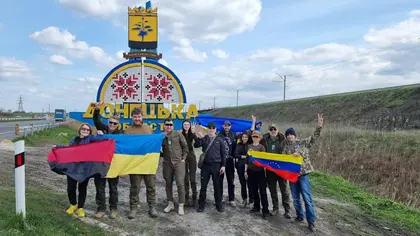After years living in Italy as a Venezuelan expatriate and online activist against the current authoritarian government in his country, Rodrigo Figueredo shares his Bolivar Battalion experience with Kyiv Post. Here he gives his recount of a recent trip he and fellow aid workers made to help a Ukrainian hospital in the Eastern warzone and soldiers defending on the front. He found that he feels a strong bond between those fighting Venezuelan authoritarians digitally and those opposing Russian authoritarianism in Ukraine.
This is my second time in Ukraine and I now have developed a network of people and relations that enable me to help the best I can. I’m a Venezuelan-born, politically-persecuted human rights artist and activist and I’ve been living in Italy for the past 8 years. I’m also a social communicator or an “influencer” of sorts. I’ve become specialized in information and counter-propaganda militancy in the digital battlefield of today's new technologies of communication and social networks through my experience as a Venezuelan resistance actor to the Chavista regime of Venezuela in particular, and of freedom causes in general.
JOIN US ON TELEGRAM
Follow our coverage of the war on the @Kyivpost_official.
I’m an artist with empathy, above everything else, and will help the fight for the cause of freedom, democracy, justice, life and humanity. You might say it’s not the most expected profile for a person to end up setting foot on the real battlefield active war zone and in the front in the Donetsk region of eastern Ukraine at a very short distance from the line of contact, yet, I went to the front, a Venezuelan went out of his “comfort zone” to the danger zone, all of it in the name of an ideal and a word; freedom.
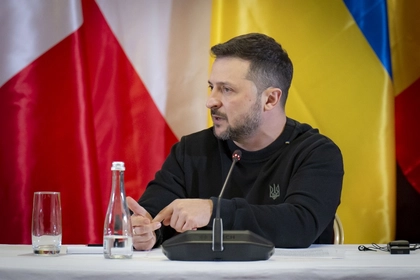
Zelensky Criticizes G20’s Weak Position on Russian Invasion
By now I guess you've figured out that I'm not a soldier nor the military-type, I'm a creative communicator who weaponizes memes, sort of a leader in a very far away cause. I shouldn't have anything to do with this invasion war of Ukraine by Russia, far away from the tropics...
How does a Venezuelan with multicultural baggage end up being in a convoy packed with humanitarian aid on its way to the Donbas to deliver, help, bear witness and tell the story? I am writing this article in order to try to express the feelings I felt there and the implications it carries.
First of all, the beginning of this trip starts with the meeting of “El Comandante” Jose David Chaparro who is also a Venezuelan who had to flee Venezuela for political reasons. He's married to a Ukrainian woman and has lived in Ukraine for a very long time now. He is well inserted and active in the military, political and human rights defense of the country since the full-scale invasion war of Russia to Ukraine started around a year ago. I met him personally for the first time a few weeks prior to this experience to the Eastern front of Ukraine and we instantly hit it off. We both share an understanding and synergy of thought, heart, conviction, principles and motivation.
Jose David Chaparro and I created the Bolivar Battalion right after we met. He’s an officer in the territorial defense and takes care of the command, logistics and formalization of projects and relations with the Ukrainians (he speaks fluent Ukrainian) while I’m a creative communicator, politologist, activist and civil leadership actor. It’s incredible to me how all the stars aligned to have all these congruent realities and dynamics evolve so fast from thought to creation to action.
A few days after the Bolivar Battalion was created, I got a call from him to tell me: "Well; get your stuff together, we have a humanitarian mission that requires us to go to the front and you’re coming with us.” After giving it very little thought I answered: “Let's go.”
I get ready, put on my camouflage vest, a pair of blue jeans (I want the symbolism to be clear when we take photos that I’m not a combatant) and my well-worn shoes and meet them in Kyiv at a very early hour. We all embark on a 7-car convoy full of aid, food, medicine, electrical generators and people knowing we are going to a very dangerous place (the most dangerous place on Earth nowadays) to bring much-needed help to people that otherwise would not have it. A sense of responsibility mixed with anxiety and confidence emerges in my mind and we’re off!
Something like a fifth of the way to our destination, we encounter two other cars going our way. One is an ambulance that was donated by a UK NGO that has to be delivered to the front. I can't stop thinking, during the eight-hour trip from Kyiv to the Donbas, that the guy driving the ambulance with the wheel on “the wrong side” is a further handicap that doesn’t seem to slow down the speeding convoy at all.
We go through numerous military checkpoints on our route. At first, we don't have to stop for control at any time, but further on everybody moving to those zones is checked with increased care the closer we get to the front. And I start to notice that the closer we get the fewer civilian vehicles are seen and the roads are only traveled by military cars and trucks, logistics trucks, and troop vehicles. When you're very close, there are no more civilian cars.
When we arrive at Pokrovsk city sign in the Donetsk Region, we’re already in the active war zone and it catches my eye as I see that even soldiers stop to take photos with the city sign that’s marked, graffitied and decorated with innumerable stickers of military unit insignia, journalists, people and humanitarian people who came here to the front.
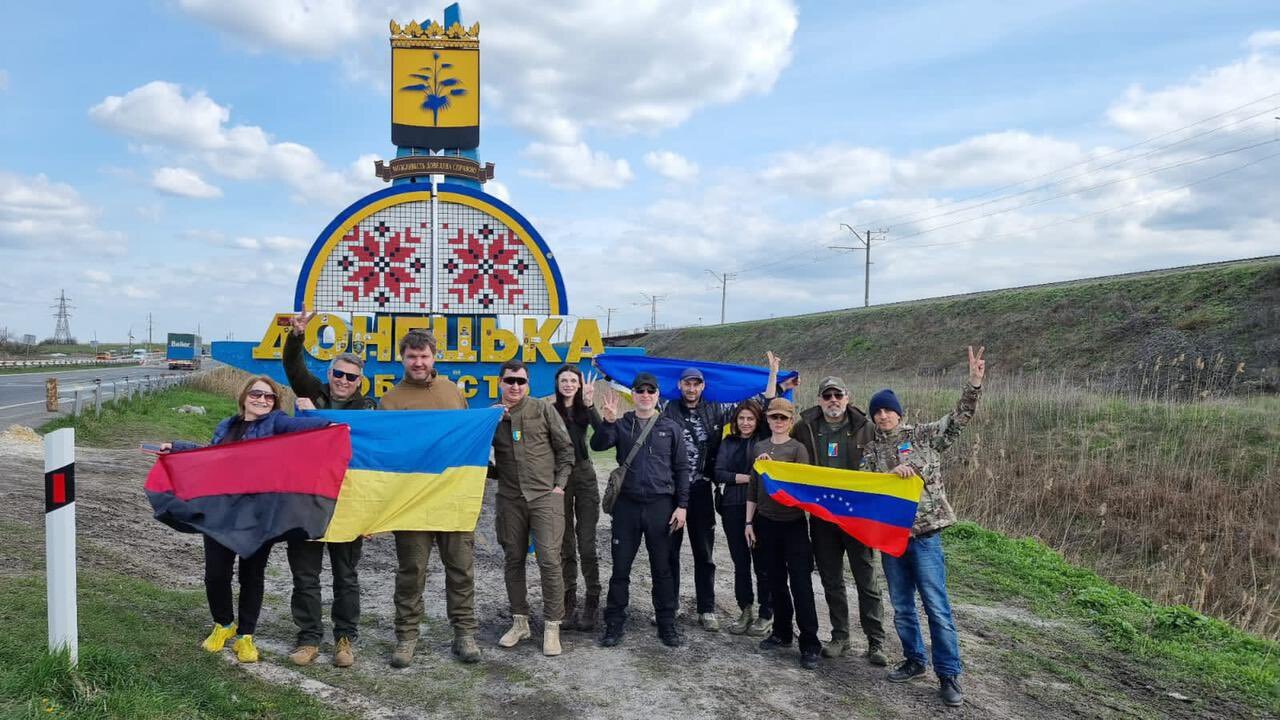
Pokrovsk is less than 40 kilometers from the contact line and it’s the place of our first delivery. I am struck by the look in the eyes of the people, doctors and nurses of the only hospital with a pediatric and maternity section in the whole active warzone. They are smiling gratefully as we unload the medical supplies and the generator, and hand over the ambulance. There are local journalists, observers, and local authorities at the site and this makes me understand how important and meaningful is any help given.
After the hospital we go to two social centers where they make food for the people and to the mayor's office to get an official document of thanks. This first phase of the mission completed we go to the hotel and “sleep.” Tomorrow we are going to the front proper to deliver goods to the soldiers themselves. That night I didn’t sleep at all - the bombarding alarms wailed at least five times during the night.
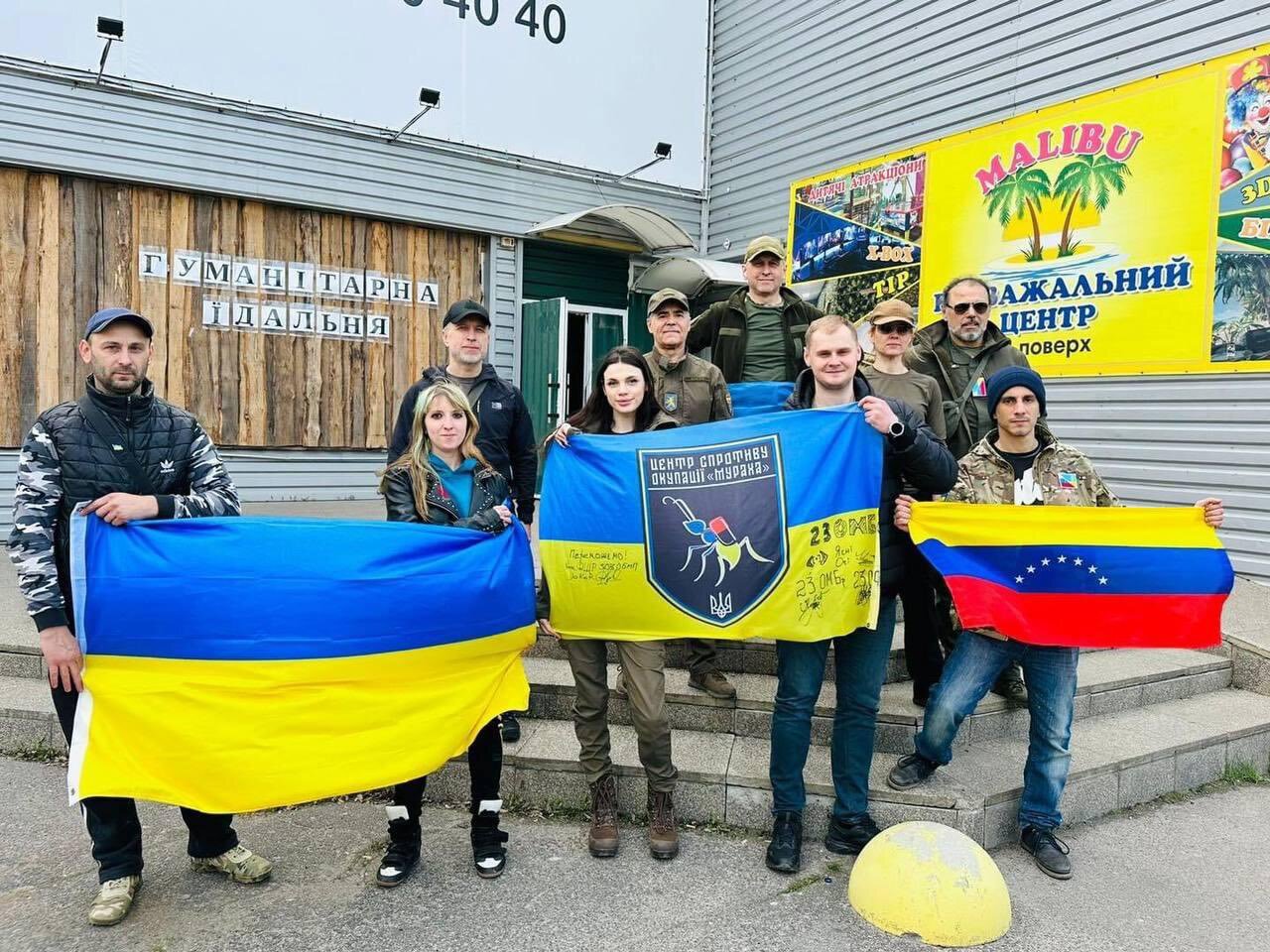
We wake up very early and we get ready to cross the last checkpoint 25 kilometers from the front itself. I’m already wearing full armor in the car as is everybody else and think to myself: “Here we go; this is the time of reckoning, the time where you go to where few go to help - taking high risks and putting into action my beliefs and empathy for these people I chose to support.” At that point we are well into enemy artillery range. As soon as we cross the checkpoint all the signs, scars and wounds of war are highly obvious - burned cars by the side of the road, trenches and military positions all over the place. I record none of them for obvious security reasons.
We arrive at the meeting point destination (a little town with a wild west feeling to it) and as soon as we get out of the cars, we can already hear the explosions of artillery “in the distance.” I want to smoke a cigarette and go buy one at an informal “store” only to realize they cost three times more here than back in Kyiv and so does everything else. Soldiers arrive in a green-painted pickup and they are very happy to see us. They tell us that at this point from the contact line we are 20 kilometers on one side and 12 kilometers on the other (and bombs can be clearly heard, some stronger than others).
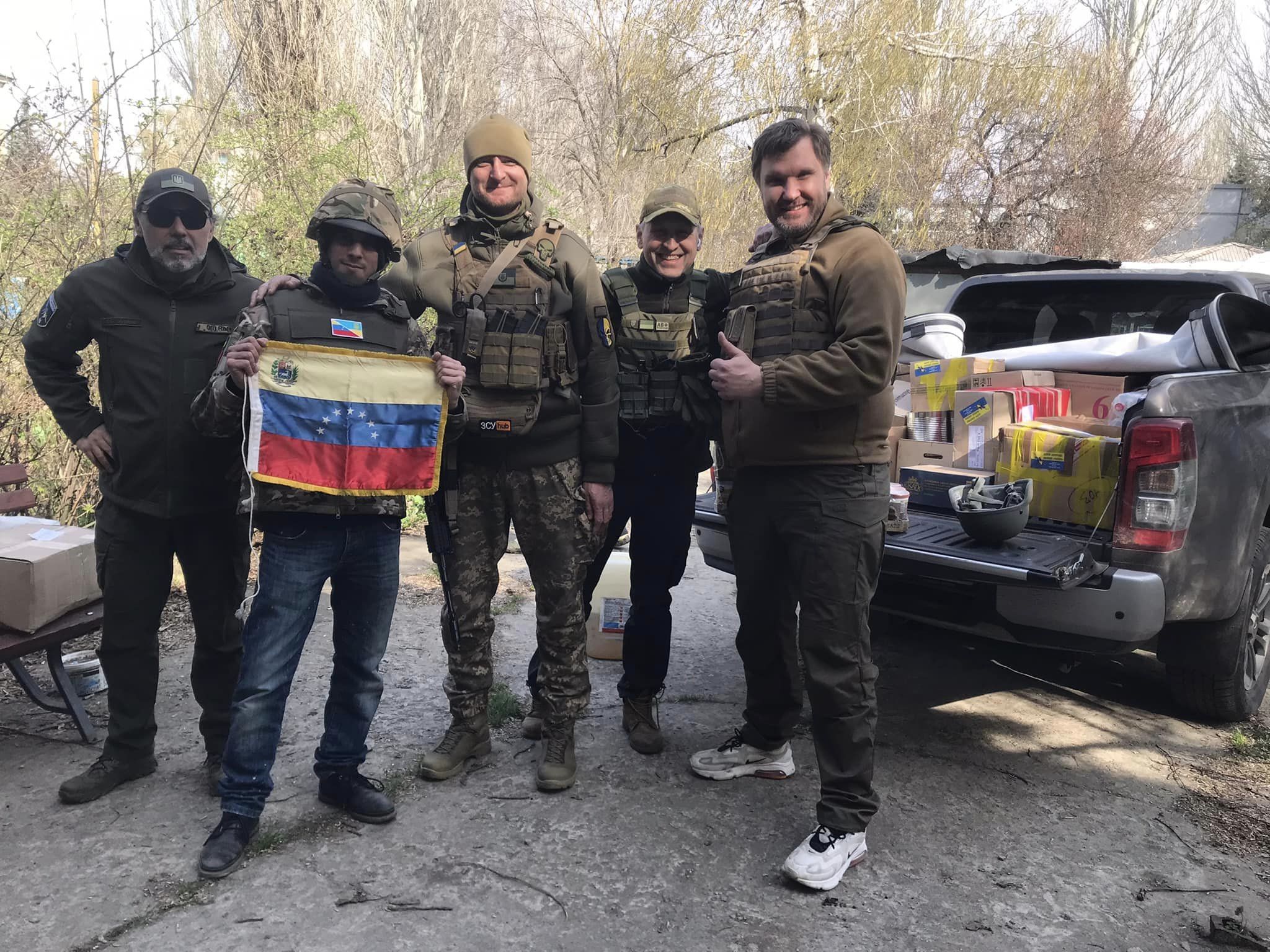
We follow them to take the stuff to their base which is simply a house they live in considered “back line” - at that moment we are 8 kilometers from the contact line. We start unpacking the cars as fast as we can. We are delivering a generator, food, water and even sodas. These soldiers are joking and happy we are there, some come out and salute us with a very welcoming attitude and even start to joke. I guess it's a way to relieve stress.
One of them asks me, where are you from? I respond I'm from Venezuela and as he gives me a surprised and grateful expression he tells me “thanks for coming here to help,” and literally hugs me and calls me “brother.” We took the opportunity to take some photos and a make a short video that I had in mind to do in order to make a symbolic “joke” and message for Venezuelans and for Nicolas Maduro (Venezuela’s dictator and Putin’s ally) where I asked the soldier to respond with a “coño de tu madre” to me when I shout “Maduro.”...
He asks me what it means and I tell him it’s an insult to our dictator who's “Putin’s suka [bitch].” He laughs hard and proceeds to do the video understanding, even though we come from far different homes and different conditions, we are in the same fight for freedom despite any cultural differences.
We are there for 2 hours at the front and it feels like a whole day. The feeling of uncertainty of life being so close to “the beast” is humbling - it’s raw, it’s mathematical and physical. You are there now, you might not be there the next second; it felt like a question of simple and cold probability.
We all leave the front with a shared feeling of accomplishment, a feeling that we were useful and did the right thing. In my particular situation, as I'm picking up a couple of rocks before we leave to bring back as a symbol and memory of being there, I'm thinking of how this action will impact our fight for freedom for Venezuelans and Ukrainians alike. I came here to show through example that we are all in the same front against evil and authoritarianism no matter where we come from.
I publish everything that same night, when we are far away from the social network sites, another front line where I fight as a digital soldier against propaganda just as those Ukrainian soldiers fight against invading forces in the fields with real bullets. The communication frontline is obviously less imminently deadly, but it does comprise its own risks when, as a Venezuelan, you hit the Russian's narrative with a symbolic “missile” this strong.
That same day, I got engaged by the Russian, Chavista and ultra-conservative propaganda trolls hard as my material went viral, at the same time lots of people send messages of support and even admiration, I was flooded with serious death threats and disqualification communication campaigns that felt all but coordinated.
Apparently, Venezuela and Ukraine’s common enemy doesn’t like seeing a Venezuelan on the frontlines.
The views expressed are the author’s and not necessarily of Kyiv Post.
You can also highlight the text and press Ctrl + Enter


